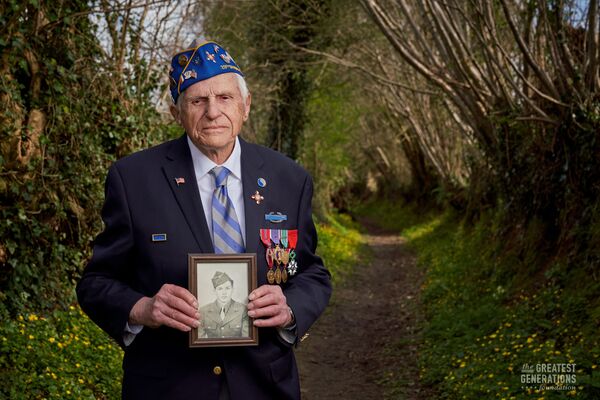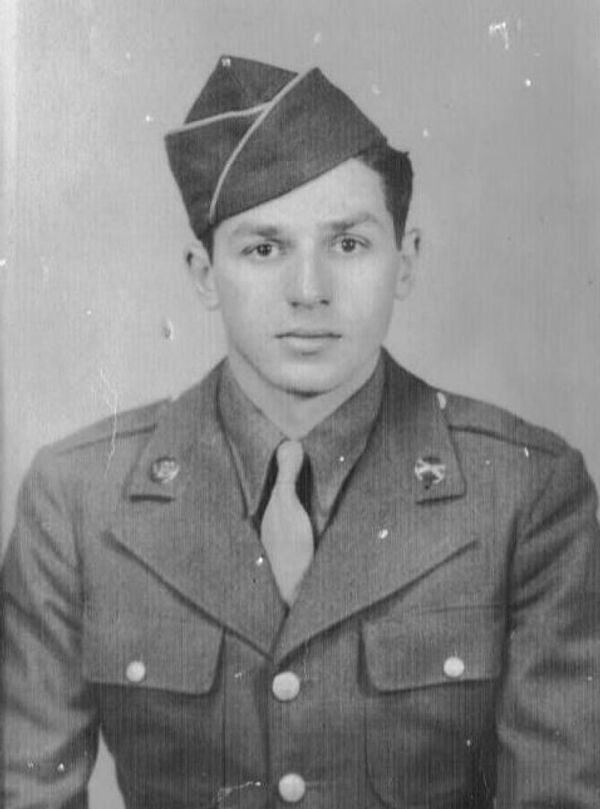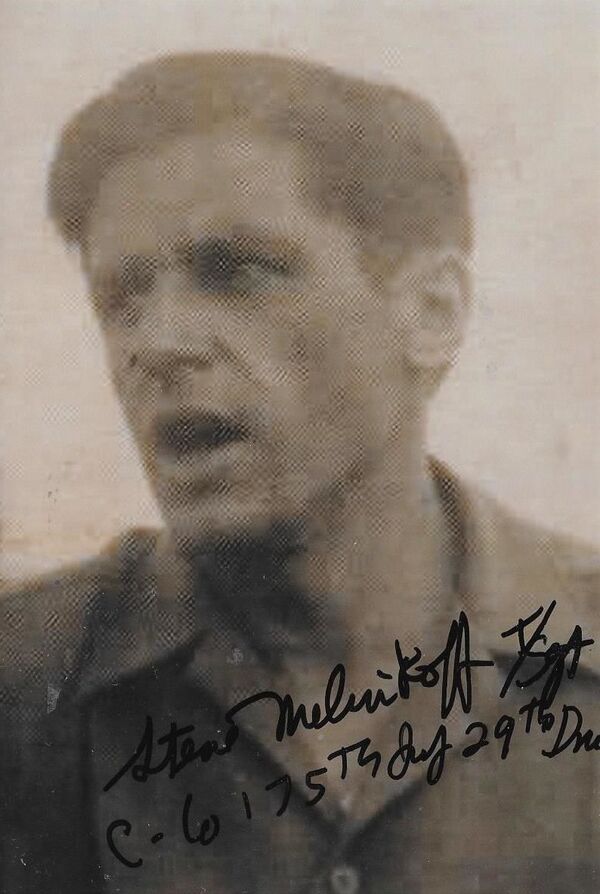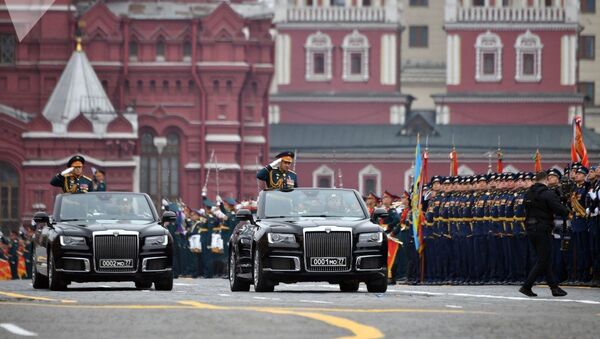Plans for Victory Day
On 9 May, to commemorate the victory of the Soviet Union and its allies over Nazi Germany in 1945, thousands of people will gather in Red Square in central Moscow to see a military march and a spectacular air show. The annual Victory Day event is attended by leaders of other states and international organisations at the invitation of the Russian government.
"I am sure I am going to Moscow," Melnikoff told Sputnik when asked about his plans for the upcoming Victory Day. "If our group [The Greatest Generations Foundation] goes to Moscow, I will be going with them, and I am looking forward to it. Our group leader is in negotiations with the embassy and all are trying to plan this out, and we are hoping that it will come about. I think it’s going to come about."
Melnikoff stressed that it is going to be important to him to be in Moscow on this day because "it was that combination that defeated the German machine."

"I realised that I am very lucky that I am here. I was injured twice and here I am - I am 100 years old still able to talk to you," he said. "I want to get this message out to everybody so we don’t have to do this over again and somehow we settle things in a way that we can live together - and that’s important to me."
The American veteran noted that the leader of the Greatest Generations Foundation, that he is part of, is thinking about trying to bring then veterans that are still able to walk and in a condition that they could come.
"We have many veterans that are not able to do it anymore. They are in homes, wheelchairs and what not. I am very mobile and so I am sure I’ll be going," he said. "I am actually hoping to meet [Russian President Vladimir] Putin."
War Years
The moment he was drafted, at the age of 23, Melnikoff said he immediately knew that they were going into combat to save the world.
"I would have been drafted earlier but I was working for four years in the shipyard building big ships - like battleship Massachusetts and heavy cruisers," he shared. "I was deferred and then I was drafted in June of 1943. We trained and we knew that we were going to combat, and we knew we had to go over there and defeat the Germans because they would have just destroyed the world. They were well on their way because they captured all of Europe and were giving Russia a very bad time."

"I was very alert," Melnikoff pointed out. "We knew that the Red Army was taking heavy losses, and I was well aware of that. And we knew we had to help because they couldn’t have won the war without us but we couldn’t have won the war without them. I know the tremendous losses that the Soviet Union took. Our motive was really to save the world. It was the war to save the world."
Melnikoff said after training in the United States, they trained five more months in England, and then he with his 29th Division, 175th Infantry Regiment, when they hit the beaches of Normandy.
"My division was one of those that hit the beach on D-day," he said. "From that point on, we just continued liberating people all the way down."
The veteran remembered that their first mission was to capture Saint-Lô, which they accomplished.
"On first attempt we didn’t make it but on the second attempt we did capture Saint-Lô," he said. "There we trapped a lot of the German soldiers."
Melnikoff shared that he was injured on 17 June, shot in the neck by an automatic weapon.
"Our regiment was in the attack for Saint-Lô. It was a battle at Hill 108, and it was there that we came within 2.5 miles and captured Saint-Lô before we were stopped. I was injured and sent back to England," he explained. "I recovered and then rejoined the company that I was in, and we fought and liberated Saint-Lô. I joined them at Vier. We captured Vier and headed south and then we headed east as we progressed towards Germany."
"So, we first, captured and liberated France. We fought through Belgium and Holland. We were there when they had the Battle of the Bulge. We were not involved because they attacked just south of us," he said. "We continued down through Belgium and Holland, and then we had several obstacles: we were stopped at the Ruhr river, but we eventually crossed the Ruhr river and we continued east. And by that time I was a sergeant in charge of the platoon. And the rest of the war, I fought as a platoon leader."
Meeting at the Elbe River
Melnikoff remembered that his army had kept going east, and captured and liberated many cities and towns along the way, before reaching the Elbe River.
"We eventually came all the way to the Elbe River - that was where we were supposed to stop by agreement of the politicians," he said. "There we were able to capture the whole rocket division of the Germans - 10,000 strong. My regiment did that. So, we waited there and in a few more days the Red Army came up to the Elbe River and that’s when we met them."
On 25 April 1945, Soviet and US troops met at the River Elbe near the town of Torgau in Germany. The meeting was a key milestone in the process of ending World War II and came as US troops advanced from the west and Soviet troops advanced from the east, thus splitting Nazi Germany in two.

Melnikoff noted that there was only limited contact with the Soviet Army, which was very important.
"I always had good feelings for them [Russians]. Actually, I only met the Russians momentarily… only a few Soviet soldiers came over to our side of the river," he said. "It was just a talking group that came over. I myself personally did not have a contact where I could talk with the people. I was there and actually hoping that they would ask me to translate, but we always had many nationalities in every company, so they had other people that were qualified."
"It [the meeting on the Elbe River] was very important because we had to take over and try to help each other because so much stuff was destroyed, so many people were lost and they needed help for each other and so for a while there was cooperation and what not," the veteran pointed out.
"Later on, things changed, but that’s politics. We can’t do politics, I don’t do politics," he said.
Life at 100
Melnikoff, an American born of Ukrainian parents and raised in the US state of Rhode Island, today lives in the state of Maryland. He has a son and a daughter, two grandsons and six great grandchildren - his oldest great-grandchild is 24.
Melnikoff celebrated his 100th birthday on 28 November, feels and looks great, and is living an active and happy life.
"I guess I am very lucky that I survived all of this. I believe I have a very positive attitude. I love people, and I treat all people equally," he said. "You also have to do things. I play golf two to three times a week. I don’t feel 100, and I hope I don’t act like [100]. I had good food, I probably have good genes. I try to live a good clean and pleasant life."
Melnikoff revealed that he also travels to Europe and always tells children and adults about the war years.
"I am spending my time going back to Europe. I talk to children, to people, take pictures with them," he explained. "I want to make sure that they realise what happened 75 years ago, how many people were lost, how many Slavic people were lost, how many French, and other people. And even our losses were 400,000, but that’s a small amount compared to how many people were lost from the Slavic people - that were lost in war."
"I talk to them in schools: I’ve talked at schools in France, in the United States. Most of all I like talking to children. I love to talk to young mothers that have small children. And I tell them, ‘take a picture.’ So, someday, when they are old enough to understand, they will know that this is Steve, and he was in WWII, he fought, and I want them to remember," the veteran added. "And the reason I do that is because when they go back to school it makes history more interesting to them, and they actually have talked to a live person who experienced that war."
Melnikoff shared that at some point in his life he reconnected with his fellow soldiers. However, he is now the only one who is alive.
"I was very lucky because I moved to an area which was the headquarters of my division. It took about 40 years after the war when I ran into my sergeant and we found a group of five soldiers that were together during the war at one time or another," he said. "We would meet once a month and talk about the war and talk about our times and everything. We did this for many years but now all those people are gone - I am the only one left because I am 100 years old."
US-Russia Relations and Attempts to Rewrite History
Melnikoff is sure that the relations between Russia and Washington will eventually have to get better.
"I think it can get better, and I think it has to get better. It’s a political thing and I try not to get too much into political things," he said.
Commenting on the present day attempts to rewrite the history, including WWII, Melnikoff said, "It’s politics and I don’t have control over politics."
"I take history as it really happened. I don’t try to change history. Whatever happened, happened. And I will not change it. I will give the story as I know it but the politicians do something else," the veteran pointed out. "You know, politicians - they say words good to say that day."
Last month, during the 75th anniversary of the liberation of the Auschwitz-Birkenau extermination camp, both the leaders of the European Union and the United States were silent about the contribution of Soviet Red Army soldiers in the liberation of the camp itself.
When asked about these most recent instances when the world leaders avoided mentioning the Soviet Army when talking about the liberation of the Auschwitz-Birkenau concentration camp, Melnikoff said, "I don’t have control over that… See, I saw everything."
"I know Auschwitz happened. I know who did it. Whatever people say, I don’t have control over that, but I know that that happened. When it happened, let’s see, we were still in Holland or Belgium, you know, we were on the way," he said. “I know that the Soviet Union rescued those people.”

